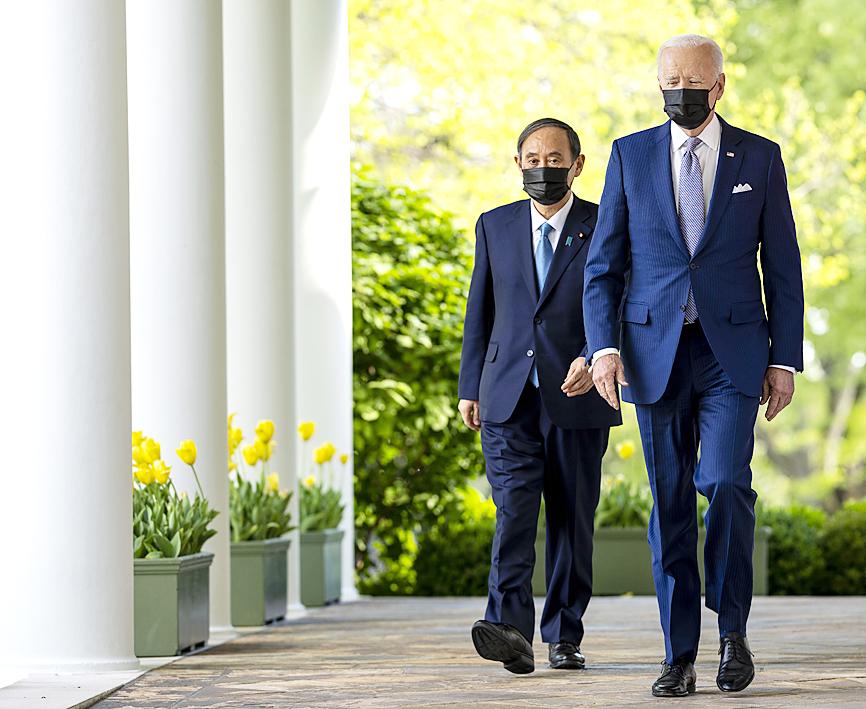The US and Japan on Friday vowed to stand firm together against an assertive China, and to step up cooperation on climate change and next-generation technology as US President Joe Biden made his first summit a show of alliance unity.
Waiting nearly three months for his first foreign guest due to the COVID-19 pandemic, Biden told Japanese Prime Minister Yoshihide Suga that his country enjoyed “our iron-clad support” on security issues and beyond.
“We’re going to work together to prove that democracies can still compete and win in the 21st century,” Biden told reporters, affectionately calling the Japanese leader “Yoshi.”
A joint statement called for “candid conversations” with China and did not hold back, raising concerns over Beijing’s growing maritime moves, growing tensions with Taiwan and its clampdowns in Hong Kong and Xinjiang.
The statement reiterated that the US-Japan Security Treaty covers the Japanese-administered Diaoyutai Islands (釣魚台) — known as the Senkaku Islands in Japan — which are also claimed by Taiwan and China, and where Beijing has increasingly shown its might.
The US and Japan “recognize the importance of deterrence to maintain peace and stability in the region,” the statement said.
As Beijing steps up air incursions around Taiwan, Biden and Suga in the statement emphasized “the importance of peace and stability across the Taiwan Strait” and encouraged “the peaceful resolution of cross-Strait issues.”
While cautiously worded, it was the first time a Japanese leader has joined a US president in a statement on Taiwan since the allies separately switched recognition from Taipei to Beijing in the 1970s.
The forthright statement comes despite Japan’s efforts in the past few years not to antagonize China, its top trading partner, including by not joining Western nations in sanctions over human rights.
Suga echoed Biden’s themes as he described the US-Japan alliance as the “foundation of peace and stability” in the Indo-Pacific region.
“Freedom, democracy, human rights and the rule of law are the universal values that link our alliance,” Suga said.
In a highly unusual comment by a Japanese leader on US domestic issues, Suga also voiced concern over a wave of attacks against Asian Americans.
Biden’s second in-person summit is to take place next month with South Korean President Moon Jae-in, part of Washington’s strategy of shoring up alliances as it zeroes in on China as the US’ most pressing challenge.
On another of his key priorities, Biden said that he and Suga agreed on the need for “ambitious” climate commitments and indicated that both nations would soon announce goals.
Biden is to lead a virtual summit next week in hopes of rallying climate pledges amid growing evidence of a planetary crisis as average temperatures hit record highs and natural disasters become more frequent.
“We confirmed that Japan and the US will lead global decarbonization,” Suga said.
Biden and Suga said that they would step up joint development and testing of 5G Internet.
The US and Japan must “maintain and sharpen our competitive edge” and ensure that “those technologies are governed by shared democratic norms that we both share — norms set by democracies, not by autocracies,” Biden said.
China’s Huawei Technologies Co’s (華為) has taken an early dominant role in 5G development, despite heavy US pressure on the company, which Washington argues poses threats to security and privacy.
The statement said that the US had committed US$2.5 billion and Japan another US$2 billion.
Masashi Adachi, a special adviser to Suga, told reporters that the agreement was more about joint development than fresh funding, pointing to several Japanese projects on 5G development.
Biden and Suga also recommitted to the denuclearization of North Korea and discussed next moves following Biden’s predecessor’s unusually personal diplomacy with the totalitarian state.
Source: Taipei Times - 2021/04/18





















